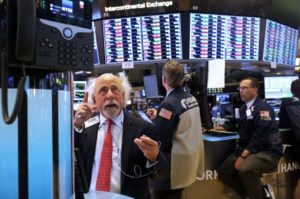Being a market analyst used to be considered hebetudinous work. In today’s economy, serving as a data gatherer and number cruncher is just brutal. If you compose a 1,500-word research note that publishes on the opening bell at 9:30 a.m., the hard work becomes obsolete by 9:35 a.m. Today’s economic landscapes and financial markets are tough to predict and challenging to fathom. But when one of America’s most significant financial firms describes the economy as being in chaos, it’s perhaps time to start asking some serious questions of those who set fiscal policy.
US Economy: An Agent of Chaos
 In recent months, Morgan Stanley has been one of the most bearish Wall Street institutions. Seth Carpenter, global chief economist for the bank, suggested “the ingredients for a global recession are on the table.” That said, Morgan Stanley’s analysts have purported that an additional selloff in US equities is likely, China’s sharp slowdown is evident, and the decay of the European economy is inevitable. Put simply, the ship is sinking, and only patchwork with a pack of gum can prevent it from being swallowed whole by the oceans.
In recent months, Morgan Stanley has been one of the most bearish Wall Street institutions. Seth Carpenter, global chief economist for the bank, suggested “the ingredients for a global recession are on the table.” That said, Morgan Stanley’s analysts have purported that an additional selloff in US equities is likely, China’s sharp slowdown is evident, and the decay of the European economy is inevitable. Put simply, the ship is sinking, and only patchwork with a pack of gum can prevent it from being swallowed whole by the oceans.
“We live in the most chaotic, hard-to-predict macroeconomic times in decades,” Carpenter wrote. “Avoiding a recession is our base case, but markets will have to confront the rising probability of one regardless.”
Even if the United States and other major markets engineer a soft landing or, as Federal Reserve Chair Jerome Powell called it, a “soft-ish landing,” the world economy is still paralyzed in a fragile state. But how did such an environment, one filled with inflation, debt, and confusion, happen in the first place?
Fed Halts the COVID Crash
In March 2020, the Dow Jones Industrial Average cratered to around 19,000, the Nasdaq Composite Index plummeted below 7,000, and the S&P 500 plunged to around 2,300. Panic submerged Wall Street’s concrete jungle. When US and state governments shut down the world’s largest economy, millions of people lost their jobs and businesses shut their doors. It was bedlam in America.

(Photo by Yana Paskova/Getty Images)
After initial hesitation and sitting on the sidelines, the Federal Reserve fired off the mother of all bombs (MOAB), unleashing upward of $9 trillion worth of liquidity into the economy over two years. From asset purchases to pandemic-related relief, the Eccles Building engaged in something unprecedented. Rather than turn off the taps once the system stopped bleeding, the Fed persisted with money creation.
Everything the Fed did might have been based on good intentions, but the central bank manufactured an environment of intense speculation, moral hazards, and bailouts with zero accountability. Powell and Co. also facilitated Washington’s disastrous decision-making that contributed to today’s intense inflationary pressures, enabling Republicans and Democrats to unleash astronomical fiscal stimulus and relief expansion that have only now been retired. Despite many Americans’ livelihoods being ruined by the state, millions of other Americans received stimulus checks and other benefits for nothing. This triggered a tidal wave of freshly created money that chased too few goods and triggered artificial demand (would the demand be prevalent without thousands of dollars in free cash?).
A Chain Reaction
The $2.2 trillion CARES Act, the $1.9 trillion American Rescue Plan (ARP), the trillions in elevated federal budgets, state support mechanisms, and other comparable packages throughout the international marketplace produced many of the problems the world is witnessing today. Although flooding the planet with voluminous units of currency is the main consequence of these reckless actions, there was also a panoply of other issues. The global supply chain crisis, the tight labor markets, the housing boom, and the unsustainable stock market were other byproducts of public policymakers’ short-term thinking.
 Now that Uncle Sam has allowed COVID-related stimulus and emergency relief programs to expire, and the Federal Reserve is tightening monetary policy, everything is falling like a house of cards. Stocks are hemorrhaging, supply chain snafus are not easing, the labor market is broken, and millions of Americans are being priced out of the housing market. Of course, as history proves, anxious and fragile market segments will be doped up with Prozac and rebuilt with duct tape and dollar-store glue without homing in on the direct causes of the broad array of toxic troubles.
Now that Uncle Sam has allowed COVID-related stimulus and emergency relief programs to expire, and the Federal Reserve is tightening monetary policy, everything is falling like a house of cards. Stocks are hemorrhaging, supply chain snafus are not easing, the labor market is broken, and millions of Americans are being priced out of the housing market. Of course, as history proves, anxious and fragile market segments will be doped up with Prozac and rebuilt with duct tape and dollar-store glue without homing in on the direct causes of the broad array of toxic troubles.
But why? Politicians lack the fortitude to be serious, investors need a steady supply of liquidity injections, and Main Street does not want to ruffle any feathers. Is this surprising? Of course not. The eminent Groucho Marx had it right when he said, “Politics is the art of looking for trouble, finding it everywhere, diagnosing it incorrectly, and applying the wrong remedies.” Twentieth-century pundit H.L. Mencken had an even more appropriate description of politicians: “A good politician is quite as unthinkable as an honest burglar.” Indeed, life is too important to be left to the government.




